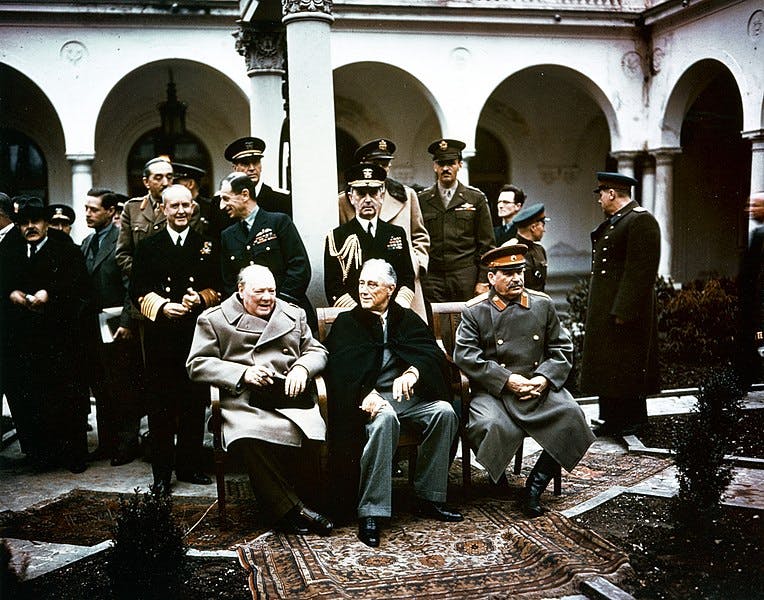Lies, Damned Lies, and the Ghosts of War
The Russian press calls a war crime a ‘disgusting fabrication,’ and blames ‘Nazis.’

As allegations of mass atrocities committed by Russia against civilians and prisoners of war filter into the Western press, Moscow denies guilt. It decries the “unscrupulous and base lies.” The Russian strongman contends the charges are a “treacherous blow” launched by a government collaborating with Nazis. The Russian press calls the accusations a “disgusting fabrication” by “fascist slanderers” and blames “Nazis.”
We’re not talking about Ukraine today but about Russia in 1943, as news emerged of the murder several years before of thousands of Poles in the Katyn Forest. It was one of World War II’s most infamous crimes, notable in retrospect for the brazenness with which Russia tried to pin the blame on others. We find ourselves thinking of the ghosts of Katyn as Russia responds today to evidence of war crimes by attempting to shift the blame to Ukraine.
This came into focus at the United Nations on Tuesday, when Russia’s envoy, Vasily Nebenzya, was confronted in the Security Council with evidence of Ukrainian civilians killed by Russian forces. Mr. Nebenzya tried to palm off on the incredulous diplomats that idea that the grim deeds had been done by Ukrainian Nazis, saying: “You simply prefer not to notice Ukrainian Nazis, but unfortunately they are there.”
That followed other prevarications by Moscow on Monday, as Ukrainians made macabre discoveries of murdered civilians following the retreat of Russian forces from the vicinity of Kiev. Russia’s defense ministry called the findings a “provocation,” in CBS News’ telling, and Foreign Minister Sergey Lavrov cited a “fake attack” on civilians. He called Ukraine’s “provocations” a “direct threat to international peace and security.”
Yet while Moscow is following Stalin’s World War II-era playbook, the response of the Western democracies marks a contrast from the fog of lies surrounding the Katyn disclosures. By 1943, Great Britain and America were entangled in an alliance of convenience with the Soviets against Nazi Germany. When the scale of the Katyn crime was discovered, the Nazis sought to discredit Russia over the massacre.
Stalin disclaimed responsibility for Katyn. He complained to FDR and Churchill that the Polish government in exile was colluding with Germany to blame the Soviets for the murder. “I fully understand your problem,” Roosevelt wrote to Stalin. He vowed to “find ways and means of getting” the Poles “to act with more common sense in the future.” Churchill bid the Poles to endorse Stalin’s claim that the massacre was a Nazi fiction.
Britain’s ambassador to the exiled Poles lamented “we have been constrained by the urgent need for cordial relations with the Soviet Government.” The Western press was no better. Life magazine at the time maligned the Poles as “the most chip-shouldered chauvinists in Europe.” Newsweek reported the Poles’ insistence on airing the truth of Katyn reflected “that curious trait of unrealism that still permeates Polish politics.”
Even after the war, America stood by as the Soviets sought at Nuremberg to prosecute the Germans for the Katyn massacre. The future Supreme Court justice Robert Jackson, who was America’s prosecutor at Nuremberg, “pleaded with his Soviet colleagues to drop the whole thing quietly in fear of major public embarrassment,” historian Dariusz Tolczyk writes. As the Cold War deepened, Katyn was largely forgotten.
Not until 1990 did Mikhail Gorbachev concede that Russia was responsible for the Katyn massacre of “thousands of Polish officers,” though he was careful to blame not the Soviet Union but “Beria and his henchmen,” referring to Stalin’s secret police chief. In Mr. Gorbachev’s appraisal of the massacre, he observed that the “graves of the Polish officers are near Soviet people’s graves, who fell from the same evil hand.”
It’s not our intention here either to acquit the Nazis of their own evil deeds or compare the Russians to the Germans. We are comparing Russians to Russians. Russia’s failure to take responsibility for Katyn reflected the moral bankruptcy of the Soviet regime. Katyn teaches that the evidence matters. Today, amid the ghastly evidence of new crimes of war, it will be important to press for a full, timely, and unflinching lustration so that the kind of lies behind which Russia hid at Katyn do not obscure the truth.

